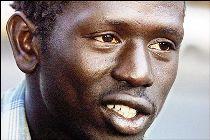Sudanese rapper, women call for African leaders to strengthen Darfur force
January 29, 2008 (ADDIS ABABA) — In a former life, Emmanuel Jal turned a gun against his government as a conscripted rebel soldier in his native Sudan.

These days, the 28-year-old child-soldier-turned-hip-hop artist has traded the machine gun for a microphone, but has kept his aim squarely on the Sudanese government. He accuses Khartoum of committing human rights abuses in Darfur, and accuses African leaders of allowing it to happen.
He and other Darfur citizen-activists brought their case to Ethiopian capital Tuesday to “tell the African leaders, ‘You’ve failed us,'” he said. More than 40 heads of state are expected here for the African Union’s annual summit starting Thursday. UN Secretary-General Ban Ki-moon plans to visit Addis Ababa during the summit to hold talks with Sudanese President Omar al-Bashir about Darfur.
The Sudanese campaigners – who included Darfuri women – urged quick deployment of a planned African Union-United Nations force to the war-ravaged western Sudanese region. They also demanded a stronger mandate that would allow the soldiers to better protect civilians.
The African Union and United Nations have pledged to send a 26,000-strong peacekeeping force to Darfur to replace an undermanned, under-equipped AU force. Deployment of the so-called hybrid force has been delayed because the Sudanese government has not agreed to accept non-African troops, and the United Nations has not been able to get governments to supply helicopters, which it says are essential for the mission to succeed.
The future of the joint force, slated to become the largest peacekeeping operation in the world, is among topics to be discussed at the AU summit. The activists argued that it wasn’t being raised urgently or forcefully enough.
“Basically, send troops and make the people secure,” said Jal, accusing the Sudanese government of foot-dragging to hold onto power.
“The AU needs to be strong. African leaders need to sanction Sudan,” said Jal, who now lives in London.
But Sudanese Foreign Minister Deng Alor said he hoped all the troops would arrive within a year.
“The hybrid force, as a host country, we accept,” Alor said. “We are ready to receive the troops. It is not Sudan” slowing the process.
AU officials say finding soldiers – particularly enough soldiers to satisfy Sudan’s demand for a “predominantly African” peacekeeping force – has been a challenge.
“We got some offers, but the countries that made the offers are not ready to go in, as such,” said Mahmoud Kane, chief of the AU’s Darfur desk.
He said one battalion each from Ethiopia and Egypt – a UN battalion can contain between 750 and 850 soldiers – should arrive by March. A battalion from Thailand should follow, he said.
Nawal Hassan, 45, one of a handful of Darfuri women calling on the African Union to come to their region’s aid, said more soldiers won’t solve the problems.
“We need protection, especially for the women,” she said. “We need troops with a strong mandate. We want an international force. Really we need neutral forces who have no interest with the Sudanese government.”
Other activists complained about soldiers who were unfamiliar with the language and culture, and about the lack of women soldiers and police officers.
The UN estimates that 200,000 people have died and 2.2 million have been displaced since ethnic African rebels in Darfur took arms against the Arab-dominated central government, accusing it of discrimination, in 2003. The conflict began when rebel groups began attacking government holdings. The government denies accusations of widespread atrocities against civilians.
(AP)
